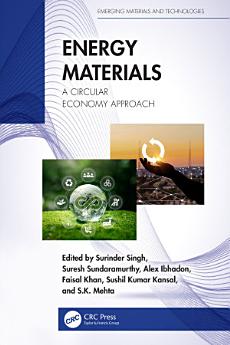Energy Materials: A Circular Economy Approach
About this ebook
• Covers fundamentals, concepts, and current initiatives within the circular economy
• Outlines technologies and materials with specific applications for energy systems, sustainability aspects and societal benefits
• Focuses on detailed aspects of processing of energy materials, kinetics, their utilization, and end-of-life management and application of circular economy in waste utilization and valorization
• Discusses technologies, processing methods, and production of materials related to fuel cells, super capacitors and battery materials, carbon based hetrostructures, catalysis, functional materials, nanotechnology, biofuels, solar and wind energy, and valuable chemicals
• Details topics related to synthesis and application of energy materials, their recycle, reuse, and life cycle
This book is aimed at students, researchers and professional engineers and scientists working in chemical, materials, energy, and environmental engineering, as well as materials chemistry.
About the author
Dr. Surinder Singh is Faculty Member at Dr. S. S. Bhatnagar University Institute of Chemical Engineering and Technology, Panjab University, Chandigarh. He earned his Ph.D. from GGSIPU University Delhi and Masters in Chemical Engineering from Panjab University, Chandigarh.
Dr. Suresh Sundaramurthy is Faculty & Former Head of Department, Chemical Engineering, Maulana Azad National Institute of Technology (MANIT) Bhopal, India. He received the Ph.D. in Chemical Engineering from Indian Institute of Technology Roorkee, India.
Dr. Alex Ibhadon is Professor of Decarbonization, Sustainability and Reactor Engineering at the University of Hull. Dr. Ibhadon is a Fellow of the Royal Society of Chemistry (CChem), Senior Fellow UK Higher Education Academy, and Member Institute of Materials. Dr Ibhadon was the Director, School of Environmental Sciences (2015-2016) and Programme Director, Chemical Engineering (2017-2022) University of Hull. Dr. Ibhadon graduated with a PhD in Physical Polymer Chemistry from the University of Birmingham, United Kingdom. He has received > £7.08M in research funding (twenty-two grant awards) from the UK Royal Society, UK Engineering and Physical Sciences Research Council (EPSRC), Newton, EU, NetZero Innovation, and the Commonwealth.
Dr. Faisal Khan is Mike O'Connor II Chair and Interim Department Head & Professor, Department of Chemical Engineering at Texas A&M University, USA. He is also the Director of Mary Kay O'Connor Process Safety Center and the Director of Ocean Energy Safety Institute. Dr. Khan is a former Professor and Canada Research Chair (Tier I) of Offshore Safety and Risk Engineering at Memorial University of Newfoundland, Canada. He is Editor-in-Chief of the Journal of Process Safety & Environmental Protection and Safety in Harsh Environments.
Prof. Sushil Kumar Kansal, Fellow Royal Society of Chemistry (FRSC), is Professor at Dr. S. S. Bhatnagar University Institute of Chemical Engineering and Technology, Panjab University, Chandigarh. He is also Dean International students at PU, Chandigarh.
Prof. S. K. Mehta, Fellow Royal Society of Chemistry (FRSC), is the Vice Chancellor of University of Ladakh, UT and Professor at the Department of Chemistry. He was the Ex-Chairman, Chemistry and Ex-Director SAIF/CIL/UCIM at Panjab University, Chandigarh. He has been a visiting scientist in the UK, Germany, Japan, USA, and France and has guided 15 postdoctoral, 48 Ph.D., and 50 Master students and handled 20 research projects.





